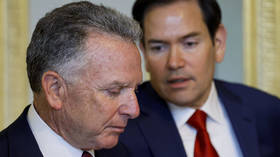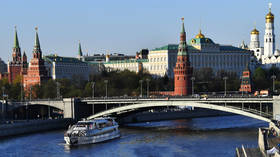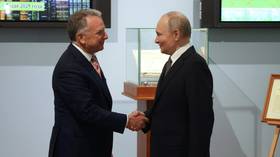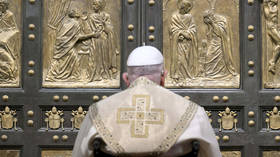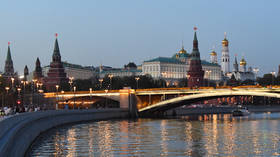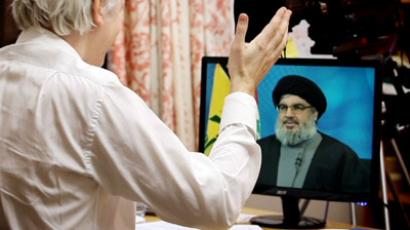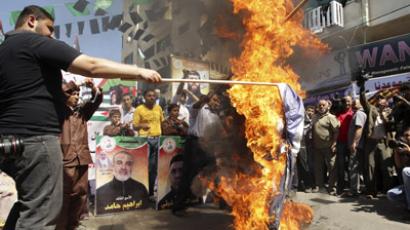‘Israelis are real fascists’ – Arab deputy speaker in Knesset
There will be no positive developments on the Israel-Palestine track under the current Israeli cabinet. The coalition is the most right-wing and anti-Arab in the country’s history believes Ahmed Tibi, an Arab deputy speaker in the Knesset.
RT:Last year the Israeli parliament passed the Nakba law that allows the state to find bodies that use public funding to commemorate the Nakba. Why was it necessary for this law to be passed in the first place and what are its implications?Ahmed Tibi: I think it’s part of the discrimination laws that were passed in the last two years in the Knesset. Especially those initiated by the Israeli Beiteinu (Hebrew: ישראל ביתנו, lit. Israel is Our Home – ed.) party of Avigdor Lieberman. This law by Alex Miller is aimed to prevent me from commemorating my history or to express my empathy to my family, which was dissolved as the community in 1948. RT: Why did the Israeli government need to pass a law like this?AT: We are talking about the most radical government ever in Israel: it's a right-wing government and it's natural that they would support such a motion. They support it more than 20 motions that were passed during this Knesset discriminating [against] the Arabs. This is the climax – trying to prevent me from saying that my family was killed or deported in 1948. They want us to dance in the street as [they do]! We can't! We have natural human feelings. RT:Has it stopped people from commemorating the Nakba?AT: No, not at all.RT: What happens if someone commemorates it?AT: I'm just coming from a discussion at an Education Committee. They are now trying to ask for sanction on Tel Aviv University because a group of students is commemorating the Nakba this evening. They are real fascists. They are trying to narrow the space where Arabs or even liberal Israelis can act, think or even express empathy.RT: You proposed a counter-bill that would forbid government from funding any organization that denies the Nakba. Were you surprised when it failed and what does its rejection mean? AT: I proposed counter-bill exactly like that of Alex Miller, but saying that anyone who ignores the Nakba should not be funded. It didn't fail in the vote. They even prevented me from putting it on the table of the Knesset, prevented me from bringing it to vote. It's an anti-democratic action by the Presidium of the Knesset. RT: You mentioned earlier dancing in the street by Israelis on Israel's Independence Day, the same day the Palestinians refer to as the Nakba catastrophe. With such a polar reaction to the same event can there really ever be peace between the Israelis and Arabs. AT: Yes, definitely. But in Australia there's a commemoration done by Australian associations for the so-called Nakba of the aboriginals. Why not do the same thing and accept the Nakba of the Palestinians? We know that when you recognize the [suffering] of the other side you bridge the gap between you and them. I have total empathy for those who survived the Holocaust. I talked about here in the Knesset, but I anticipate from the Jewish people who suffered a lot in Europe as a victim to have empathy to the [suffering] of the victim's victim. We are the victims of the Israelis from 1948 up to today. RT: Many people say the Holocaust was needed to establish the state of Israel. How fair do you think it is to reconcile the Holocaust with the Nakba that followed? AT: I do believe that we can find the mid-point in order to meet. The historical compromise should be two-state solution. It is only 22 per cent of historical Palestine, but yet Israel and Prime Minister Netanyahu and the right-winged Israel which is the mainstream are refusing this historical compromise and are proposing Bantustans. There will be no compromise unless there will be independent Palestinian state on 1967 occupied territories. RT: Do you think that empathy will come from the Netanyahu government, especially now that he has formed a coalition government giving him a safe majority and making him potentially the most powerful prime minister in Israel's history?AT: No, at all. I'm not naive: there will be no change in the Israeli government policy even after Mofaz (Shaul Mofaz, leader of the Kadima Party – ed.) got into the coalition. Netanyahu is leading this government, he dictates and he decides on the Israel-Palestinian track and according to the letter he sent to President Mahmoud Abbas, there's no change in his position and there will be no dramatic developments in the Israel-Palestinian track. RT: But in the past advances in the Israeli-Palestinian track were made when right-wing Israeli governments were in power. Why do you think that its right-wing governments that have been able to effect change? AT: No, it's not true when it comes to Palestinian issue. Still, there was no withdrawal. There was no agreement with any Israeli government about the Israeli-Palestinian track. Yet you are right [in] saying that [the] leader of the right-wing can lead with much more support to withdrawal. But is Netanyahu the right man to do that? I can't say so.RT: Throughout your career you have expressed solidarity with Israel's enemies and been highly critical of the Israeli government. But many Israelis would argue that the freedom of speech you have is not a freedom that you would have if you were critical of an Arab government and sitting in that government. How do you respond to those claims?AT: This is a stupid comparison because Israel is claiming that it's a Western democracy. The comparison should be made with Norway, with France, with Sweden, with Britain, not with dictatorship in the Middle East. But if they are willing to compare themselves with dictatorships – welcome to the club.RT: Today the Nakba day highlights the plight of the Palestinian refugees. According to the UN we are talking today of some 4.7 million refugees. Is it the intention of these refugees to actually return physically to the state of Israel or Palestine? AT: There is the Arab Peace Initiative. It is clear, it's obvious and it still on the table, there is an article dealing with the issue of refugees, an agreed solution to all parties. Yet Israel is not even dealing with that proposal, with Arab Peace Initiative, neglecting the outstanding readiness of the Arab countries to have this historical peace contract with Israel accepted. In the area 57 Arab and Muslim countries are saying: total withdrawal – total peace. The issue of the refugees should be dealt [with]. I can't accept Israeli pre-reduction of the issue even before sitting to the table. This is a very important, delicate, sensitive issue for the Palestinian people and it should be discussed seriously and solved. RT: Ahmed Tibi, thank you very much for joining us here on RT!AT: Thank you!



